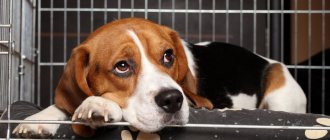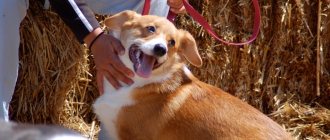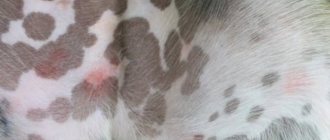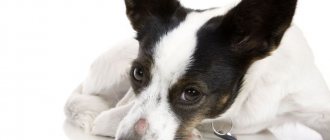Cough in small breed dogs appears under the influence of many factors: from hypothermia to serious poisoning. Competent actions by the owner and a timely visit to the veterinarian prevent dangerous complications. Often, a pet is diagnosed with a chronic helminthic infestation or a foreign body in the throat.
What should you do if your dog has a cough, as if he’s choking? What diseases are accompanied by a negative symptom? What medications effectively soothe irritated throats in dogs? What should you not do if your pet has a cough? The answers are in the article.
Probable Causes
A dog coughs under the influence of many negative factors: from a mild cold to severe poisoning. You can find out the cause in a veterinary clinic, taking into account additional symptoms and factors that caused the cough in your four-legged pet.
The main causes of the problem:
- infectious diseases;
- severe intoxication;
- helminthic infestations, protozoa infection;
- a foreign body has entered the throat;
- “kennel cough” or adenovirus develops, an infection common in dog kennels;
- a cold caused by hypothermia, eating cold food or ice water in hot weather.
Symptoms of diseases
With helminthic infestations and parasitic infections, additional manifestations appear:
- the dog is lethargic, no appetite;
- the animal often “rides” along the floor, trying to relieve the itching in the anal area; excessive appetite appears;
- the animal seems to be trying to cough up, to push out parasites that irritate parts of the body. Some parasitic worms and protozoa are so small that they easily penetrate the heart muscle, blood, and respiratory tract;
- the animal weakens, the condition of the coat and appearance deteriorate;
- In the pet's feces, larvae, eggs and adult parasites are visible: roundworms and tapeworms.
How to treat conjunctivitis in a dog and how to promptly recognize the onset of the disease in a pet? We have the answer!
The advantages and disadvantages of Brit Premium dry food for small breed dogs are written on this page.
Poisoning:
- the dog coughs, mucus and blood are often visible in the discharge;
- the animal is lethargic, loss of appetite;
- diarrhea develops, the stool is very liquid, also with blood or foam;
- possible increase in temperature;
- The dog may vomit.
Cold:
- cough;
- general weakness;
- discharge from the nose and eyes;
- elevated temperature in the dog;
- wheezing.
Infectious diseases:
- the pet not only coughs, but also looks bad, the condition of the coat worsens (it becomes dull, falls out);
- the temperature often rises;
- A blood test shows an increase in the level of ESR and leukocytes; bacterial culture reveals the pathogen.
Allergic reactions:
- a four-legged pet not only coughs frequently, but also has watery eyes and sneezing;
- The temperature in dogs with allergies rarely rises;
- If you are sensitive to various types of irritants, dandruff, dry skin, and hair loss may occur.
On a note! If your pet coughs only during a walk, you will have to check the size of the strap: perhaps the collar is too tight. It is important to eliminate the discomfort in time so that the animal does not suffer.
The main types and causes of cough in dogs
In brachycephalic dogs (Spitz, pugs, bulldogs), wheezing, coughing and the so-called reverse sneezing or reverse cough are due to the specific structure of the skull. In other breeds, they can be triggered by stress caused by a sudden change of environment or fear.
If your pet coughs after prolonged barking, there is no need to worry. However, a dog’s cough is often a sign of serious illnesses, including:
- inflammation of the respiratory system;
- tracheobronchitis;
- oral infections;
- heart diseases;
- tumors;
- parasitic infection;
- allergy;
- tracheal collapse.
In addition, a severe cough may be caused by irritation caused by contact with smoke or fumes, or the presence of a foreign object in the respiratory tract.
You should pay attention to the nature and duration of the cough, as well as the presence of other symptoms, such as:
- weakness;
- sleep disturbance;
- temperature increase;
- loss of appetite;
- aggressive behavior;
- nausea and vomiting;
- weight loss;
- formation of ulcers in the mouth, bleeding gums;
- enlarged lymph nodes.
Important! If your dog develops a cough that continues on the second day, or if additional symptoms are observed, you should contact your veterinarian.
Nursery
Kennel or kennel cough is the name given to viral laryngotracheitis or tracheobronchitis, an infection of the pulmonary system transmitted by airborne droplets from one dog to another.
Characteristic symptoms:
- dry, hacking cough;
- lethargy;
- sneezing;
- vomiting and nausea;
- snorting sounds;
- loss of appetite;
- swelling of the throat;
- enlarged tonsils.
As a rule, the first symptoms appear 2-14 days after infection.
The disease can develop in both a puppy and an older dog that is in close contact with other animals, for example, in a shared enclosure, kennel, pet store or at an exhibition.
Important! Lack of timely treatment can trigger the development of pneumonia.
Pneumonia
Pneumonia can occur both as a result of a complication of viral tracheobronchitis, and due to fungi, liquids or food debris that have entered the respiratory system.
With this pathology, the dog has a deep, barking, hoarse, wet cough, sometimes with phlegm. In addition, a pet with pneumonia becomes lethargic, loses weight sharply, loses appetite, body temperature rises, and wheezing is heard in the lungs.
Cordial
The main cause of cardiac cough is damage to the mitral valve. The pathology provokes an increase in the size of the heart and the accumulation of fluid in the lungs, which puts strong pressure on the trachea.
This symptom also occurs with dilated cardiomyopathy. This pathology is typical for dogs of large breeds (Dobermans, Labradors, Shepherds); it is extremely rare in puppies and adult animals weighing up to 7 kg.
Signs of the disease:
- accumulation of fluid in the abdominal cavity;
- coughing;
- dyspnea;
- weakness;
- loss of appetite;
- gums have a bluish-gray tint;
- decreased activity;
- The dog wheezes and develops a dull cough, especially when barking or exercising.
The pet coughs at night and in the morning, and has difficulty withstanding hot and humid weather. From the outside it seems as if he is trying to regurgitate something or cannot clear his throat.
Read The essence of arthrodesis on the joints of a dog: indications, complications and reviews
Reference! Disturbances in the functioning of the cardiovascular system lead to stagnation in the body and the occurrence of liver, pulmonary, and kidney failure.
Parasitic
Keeping a dog, especially a puppy, in unsanitary conditions can lead to infection with toxacara and hookworm. This occurs as a result of an animal ingesting adult parasites or their larvae, which over time enter the lungs and bronchi, irritate them and provoke inflammation.
In addition to the fact that the animal has a frequent dry or moderately wet night cough, which gets worse when lying down, the following symptoms are characteristic of helminthic infestation:
- deterioration in appearance;
- lethargy and fatigue;
- drowsiness;
- inability to swallow;
- sudden weight loss;
- swelling of the sternum and front legs;
- dyspnea;
- wheezing;
- lack or increase of appetite.
In addition, infection can even occur as a result of a mosquito bite: insects transmit heartworms or heartworms that affect internal organs. Dirofilariasis is difficult to cure, so great attention should be paid to prevention - deworming and treatment with insect repellents.
Oncological
A deep cough with sputum and blood may be a symptom of the appearance of a malignant neoplasm in the bronchi or heart muscle. In addition, with this pathology, shortness of breath, general lethargy, fever, and lack of appetite are observed.
As a rule, the disease develops in older dogs.
Allergic
If your pet only has a strange cough at certain times of the year, it may be an allergy. The irritant can be insects, flowering plants, pollen. In addition, an allergic reaction can occur after eating, using inappropriate care products (shampoos, balms) and after anesthesia.
When an allergy occurs, the pet coughs incessantly and sneezes. Associated symptoms are also observed:
- blueness of mucous membranes;
- increased lacrimation;
- redness of the eyes;
- itching;
- rash.
In some cases, an increase in body temperature may occur.
Important! Treatment is possible only after identifying the allergen.
Entry of foreign objects
A cough may appear if the dog choked as a result of swallowing food too quickly, ate burdock or something else during a walk, or has a viral disease or problems with the central nervous system.
The entry of foreign objects into the mucous membranes of the respiratory tract provokes their irritation and itching, as a result of which the dog:
- chokes, vomits, coughs until vomiting;
- sneezes;
- wheezes;
- tries to clear his throat;
- suffocates;
- refuses food.
The cough is constant, blood may appear, as well as foamy discharge from the nose.
This type of cough can be caused by both choking from the collar and swelling or fluid in the airway. It is necessary to take your pet to the veterinary clinic as soon as possible, since surgical intervention may be required.
Tracheal collapse
The pathology is usually observed in small dogs, such as toy poodles, Chihuahuas, toy terriers, and Pekingese. Due to congenital or acquired developmental anomalies, their tracheal tissues become inflamed and softened, which leads to regular dry cough, shortness of breath, wheezing, attacks of suffocation, and vomiting while eating or after drinking.
If a dog, particularly a Pomeranian or Yorkshire Terrier, coughs incessantly in the morning, this may be the first sign of tracheal collapse.
Attention! Lack of timely assistance leads to death caused by suffocation.
Treatment
Cough is one of the symptoms of the disease, and not an independent pathology. Only after determining the cause of the negative manifestation can therapy begin.
Rules
Algorithm of action when a dog develops a cough:
- to measure the temperature;
- examine the oral cavity and mucous membranes for ulcers, wounds, and foreign objects;
- you should not squeeze your throat, trying to feel if the bone is stuck;
- It is useful to check your pet’s stool: it may be easy to identify tapeworms or roundworms in the stool;
- if the dog is bleeding from the mouth or foam appears, you need to urgently take the animal to the veterinary clinic: perhaps the dog has swallowed something poisonous or has become intoxicated from stale food;
- In case of severe weakness, lack of appetite, coughing, watery eyes, sneezing, it is important to give the dog an antihistamine (allergy tablet). If your pet has not previously had negative reactions to irritants, then you need to consult a veterinarian;
- if there is a sharp deterioration in health, you need to urgently take the animal to the clinic to take emergency measures;
- A visit to the veterinarian is mandatory in any case, even in the absence of severe signs of damage to the body. It is important to figure out what the cause of the problem is and get tested.
Medicines
All medications are selected by a veterinarian taking into account the disease identified based on the results of the examination and tests. You cannot give your animal medications on your own, even if the pet has a chronic pathology: the veterinarian should periodically check whether the effect of the medications prescribed earlier is weakening.
The main types of drugs for the treatment of pathologies that cause coughing in dogs:
- parasitic infections. Deworming agents: tablets, suspension, powders, compositions for internal and external use. General strengthening drugs, blood purification compositions (infusion solutions), vitamins, drugs that relieve signs of intoxication after the death of parasites;
- viral infections. Antiviral drugs, vitamin and mineral complexes, tablets for fever, inflammation and pain, compositions to strengthen the immune system;
- bacterial infections. Antibiotics, probiotics to restore intestinal microflora, immunomodulators, vitamins;
- inflammatory processes. Preparations of the NSAID group, compositions for strengthening immune defense;
- allergy. Antihistamines: for a weak reaction - 2 and 3 generations, for a severe immune response - fast-acting names of the 1st generation (Suprastin, Tavegil). A special veterinary drug Allervet for allergies in dogs.
Treatment of cough in dogs and puppies
Kennel cough is a symptom of some pathology, which can only be diagnosed by an experienced veterinarian. You should not draw conclusions about your pet’s health status on your own.
Read 10 symptoms of allergies in dogs and effective ways to treat the disease
To make a diagnosis, the veterinarian prescribes a set of necessary tests and collects the animal’s history, including finding out its age, gender, breed, asking about previous diseases, the nature of the cough and its accompanying symptoms.
The treatment regimen is selected for each dog individually, since therapy methods that are suitable for one animal may not help or even harm another.
Aviary
To successfully treat kennel cough in dogs, it is necessary to use expectorants and emollients; in severe cases, it is impossible to do without the use of broad-spectrum antibiotics. However, due to the negative impact on the dog’s body, they are prescribed only during an exacerbation that threatens to develop into pneumonia.
Important! You cannot treat your pet with medications intended for humans - they contain too high a concentration of the active substance.
The owner can also alleviate the pet’s condition and contribute to its speedy recovery. To do this, it is necessary to provide the dog with adequate care by placing it in a warm room with a sufficiently high level of humidity, eliminating the possibility of the mucous membranes drying out after sleep.
Pneumonia
For bacterial pneumonia, the animal is prescribed broad-spectrum antibiotics, expectorants in the form of tablets or syrups (for example, Lazolvan) and a course of multivitamins.
If the disease occurs due to fungi, it is necessary to first identify the pathogen and only then prescribe a drug whose action is aimed at combating this particular strain of fungi. Today, fungal pneumonia is best treated by inhalation.
The dog also needs to be provided with rest, kept in a warm place and a light diet.
Cordial
Cardiac hypertrophy and accumulation of exudate in the lungs, which lead to cardiac cough, can only be detected using ultrasound or x-ray diagnostics.
Treatment should be aimed at the root cause of the pathology, therefore, the use of cardiac and diuretic drugs is prescribed to reduce swelling and vitamins to maintain the animal’s immunity. In some cases, it is necessary to take antibacterial agents.
You also need to minimize your pet’s physical activity, reduce the amount of liquid it consumes, and use emollients and expectorants to facilitate coughing.
Only a cardiologist can prescribe treatment based on the medical history and tests performed. The result of therapy depends on the age of the dog and the stage of development of the disease.
Parasitic
First of all, you need to find out what kind of parasites your pet is infected with. To do this, the veterinarian takes tests from the dog, and then, based on the results obtained, prescribes a drug whose action is aimed at removing helminths from the animal’s body. After helminthiasis is cured, the incomprehensible cough stops.
Treatment of parasitic infestation is possible only in a veterinary clinic, since it involves the use of specific drugs, most often containing arsenic. Despite the insignificant amount of toxic substance in the composition of the medicine, it should not be used at home.
Oncological
In most cases, cancerous tumors in dogs are not treatable, and all that a veterinarian can do is to alleviate the animal’s condition using medications.
For these purposes, vitamins A, C, E and group B are prescribed, as well as steroids, bronchodilators and bronchodilators - they help relieve inflammation and make the dog’s breathing easier.
Expectorants and Echinacea help remove mucus and blood clots that accumulate inside the bronchi and make breathing difficult.
Allergic
Allergies are one of those diseases that cannot be completely cured. Therapy consists only of stopping the symptoms that appear.
First of all, it is necessary to identify the allergen and eliminate or at least minimize the animal’s contact with it. Then antihistamines, vitamins and agents aimed at maintaining the immune system are prescribed.
Read Causes of alopecia in Spitz: effective ways to eliminate the problem
Entry of foreign objects
If your dog can't clear his throat after eating, he's probably choking on a bone or something else. In any case, a foreign object stuck in the esophagus or adhering to the mucous membrane must be removed. You should not do this yourself, without the help of a veterinarian - this can only harm your pet.
In such a situation, the doctor performs an endoscopy, that is, removes the irritant from the respiratory tract using tweezers and a special backlit mirror.
If the animal behaves aggressively and does not allow the specialist to approach it, the procedure is performed under general anesthesia. If a dog has trouble breathing and loses consciousness, the veterinarian will perform a tracheotomy to allow air into the lungs before removing the foreign object.
Important! You should not give your animal a laxative - this will only make the situation worse.
Tracheal collapse
At an early stage of the disease, the dog is prescribed drugs and nutritional supplements that promote the restoration of tracheal tissue. If treatment does not give a positive result or the disease was discovered too late, an operation is necessary to replace the damaged tracheal rings with artificial implants.
What not to do
The basic rule is that self-medication is prohibited. Do not give tablets or suspension until the animal has been examined by a veterinarian.
Important details:
- Perhaps the cause of the cough is not a cold, but the presence of a foreign body in the larynx. In this case, antibiotics are not only useless, but also harmful: the drugs suppress the immune system.
- If you are coughing with blood, foam, or a sharp deterioration in your health, you should not hesitate to visit a veterinarian: signs indicate damage to the larynx and other parts of the respiratory tract by a foreign, often sharp, object or poisoning by toxic drugs, poisons, mercury.
- For colds and sore throat, incorrect selection of antibacterial drugs can lead to the development of pathogen resistance and the transition of the disease to the chronic stage. Antibiotics should not be given until the type of microorganisms causing the unpleasant symptom is determined.
Look at the description of the Longhaired Rabbit Dachshund dog breed, and also learn about keeping a pet.
The first signs, symptoms and effective methods of treating pyoderma in dogs are written on this page.
Follow the link and read about how a dog is vaccinated and what diseases should be vaccinated against.
What to do if your cough doesn't go away
Be sure to contact your veterinarian for a re-examination. It is important to understand what factor prevents the full recovery of your four-legged pet.
Owners of small dogs should take note:
- It is possible that the dose of antibiotics is lower than optimal; there are still pathogens of the infectious disease in the animal’s body.
- If a small breed dog constantly tries to cough, the appetite increases or, conversely, decreases, the animal becomes apathetic, then the complex of symptoms indicates the development of a helminthic infestation. Perhaps the initial examination was carried out incorrectly or the owner did not give anthelmintic medications according to the schedule. If the rules of deworming are violated, dogs develop complications, including in the respiratory tract.
Cough prevention
To cure a dog’s cough, whether it is an independent syndrome or a sign indicating some pathology, will require a lot of time, effort and material costs. Some diseases can be forgotten after 2-4 weeks of therapy, others require longer treatment or cannot be treated at all. That is why you should pay maximum attention to preventive measures and follow general recommendations regarding protecting the health of the animal.
Self-examination
In order to promptly notice any deviations in the pet’s health, it is necessary to regularly examine its mucous membranes, coat and skin, monitor the dog’s general activity, its motor skills and musculoskeletal system.
If negative changes associated with at least one parameter are detected, you should immediately contact your veterinarian.
Visit to the veterinarian
Another measure to prevent the development of serious pathologies, as well as a way to avoid their detection at a late stage of development, is regular visits to the veterinarian.
You need to conduct routine examinations with a specialist at least once every six months, ideally quarterly.
Vaccinations
Timely vaccination, carried out according to the schedule, helps the animal develop immunity to most canine viruses, parasitic and fungal diseases, as well as diseases of the central nervous system.
You can vaccinate your dog yourself at home, but a note about vaccination must be in the veterinary passport.
Daily hygiene
The main way to prevent coughing in a dog is to provide proper care, comply with the conditions of keeping the pet and perform hygiene procedures.
It is necessary to provide the animal with a personal place to sleep and rest, which should be warm and soft and located away from drafts - keeping the pet in cold or damp conditions provokes the development of diseases.
There are also requirements regarding nutrition: bowls for water and food must be clean, food must be fresh, cut into small pieces that the dog can swallow without choking, and adherence to the feeding regime will prevent severe hunger and rapid swallowing.
It is also necessary to regularly walk your pet in the fresh air, provide it with the necessary level of physical activity, regularly bathe it and carry out deworming and treatment for external parasites.











